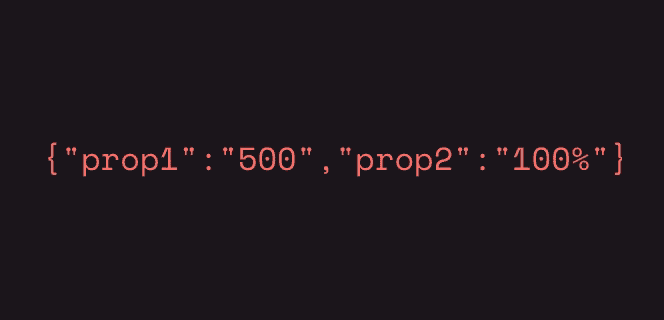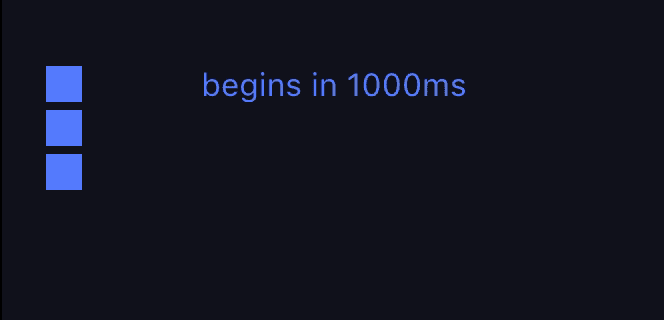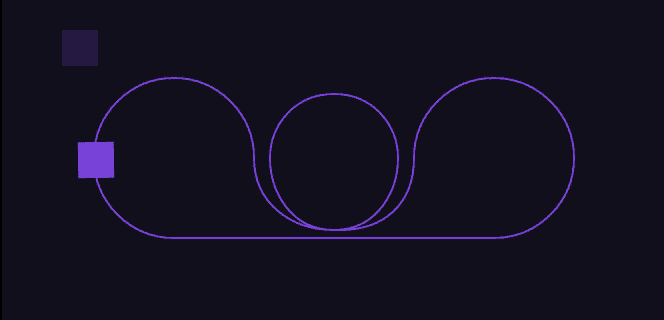Browser support
| Chrome | Safari | IE / Edge | Firefox | Opera |
|---|---|---|---|---|
| 24+ | 6+ | 10+ | 32+ | 15+ |
Usage
$ npm install animejs
# OR
$ bower install animejsimport anime from 'animejs'
Or manually download and link anime.min.js in your HTML:
<script src="anime.min.js"></script>Then start animating:
anime({
targets: 'div',
translateX: [
{ value: 100, duration: 1200 },
{ value: 0, duration: 800 }
],
rotate: '1turn',
backgroundColor: '#FFF',
duration: 2000,
loop: true
});API
Targets
The [targets] property defines the elements or JS Objects to animate.
| Types | Examples |
|---|---|
| CSS Selectors | div, .item, path, #el … |
| DOM Element | document.querySelector('.item') |
| NodeList | document.querySelectorAll('.item') |
Object |
{prop1: 100, prop2: 200} |
Array |
['div', '.item', domNode] |
Animatable properties
| Types | Examples |
|---|---|
| CSS | opacity, backgroundColor , fontSize … |
| Transforms | translateX, rotate , scale … |
| Object properties | Any Object property containing numerical values |
| DOM attributes | Any DOM attributes containing numerical values |
| SVG attributes | Any SVG attributes containing numerical values |
➜ Animatable properties examples
CSS

Any CSS properties can be animated:
anime({
targets: 'div',
left: '80%', // Animate all divs left position to 80%
opacity: .8, // Animate all divs opacity to .8
backgroundColor: '#FFF' // Animate all divs background color to #FFF
});Individual CSS transforms

CSS transforms can be animated individually:
anime({
targets: 'div',
translateX: 250, // Animate all divs translateX property to 250px
scale: 2, // Animate all divs scale to 2
rotate: '1turn' // Animate all divs rotation to 1 turn
});JavaScript Object properties

Any Object property containing a numerical value can be animated:
var myObject = {
prop1: 0,
prop2: '0%'
}
anime({
targets: myObject,
prop1: 50, // Animate the 'prop1' property from myObject to 50
prop2: '100%' // Animate the 'prop2' property from myObject to 100%
});DOM Attributes

Any DOM Attribute containing a numerical values can be animated:
<input value="0">anime({
targets: input,
value: 1000 // Animate the input value to 1000
round: 1 // Remove decimals by rounding the value
});SVG Attributes

Any SVG Attribute containing a numerical values can be animated:
<svg width="128" height="128" viewBox="0 0 128 128">
<polygon points="64 68.73508918222262 8.574 99.9935923731656 63.35810017508558 67.62284396863708 64 3.993592373165592 64.64189982491442 67.62284396863708 119.426 99.9935923731656"></polygon>
</svg>anime({
targets: 'polygon',
points: '64 128 8.574 96 8.574 32 64 0 119.426 32 119.426 96'
});Property parameters

Defines duration, delay and easing for each property animations.
anime({
translateX: {
value: 250,
duration: 800
},
rotate: {
value: 360,
duration: 1800,
easing: 'easeInOutSine'
},
scale: {
value: 2,
duration: 1600,
delay: 800,
easing: 'easeInOutQuart'
},
delay: 250 // All properties except 'scale' inherit 250ms delay
});➜ Property parameters examples
Function based property parameters

Get different property parameters for every target of the animation.
The function accepts 3 arguments: target, index, targetLength.
anime({
targets: 'div',
translateX: 250,
rotate: 180,
duration: function(target) {
// Duration based on every div 'data-duration' attribute
return target.getAttribute('data-duration');
},
delay: function(target, index) {
// 100ms delay multiplied by every div index, in ascending order
return index * 100;
},
elasticity: function(target, index, totalTargets) {
// Elasticity multiplied by every div index, in descending order
return 200 + ((totalTargets - index) * 200);
}
});➜ Function based parameters examples
Animation parameters

Parameters relative to the animation to specify the direction, the number of loops or autoplay.
anime({
targets: 'div',
translateX: 100,
duration: 2000,
loop: 3, // Play the animation 3 times
direction: 'reverse', // Play the animation in reverse
autoplay: false // Animation paused by default
});➜ Animation parameters examples
Property values
Single value
Defines the end value of the animation.
Start value is the original target value, or default transforms value.
anime({
targets: 'div',
translateX: 100, // Add 'px' by default (from 0px to 100px)
rotate: '1turn', // Use 'turn' as unit (from 0turn to 1turn)
scale: '*=2', // Multiply the current scale value by 2 (from 1 to (1 * 2))
backgroundColor: '#FFF', // Animate the background color to #FFF (from 'rgb(0,0,0)' to 'rgb(255,255,255)')
duration: 1500
});From > To values

Force the animation to start at a certain value.
anime({
targets: 'div',
translateX: [100, 200], // Translate X from 100 to 200
rotate: ['.5turn', '1turn'], // Rotate from 180deg to 360deg
scale: ['*=2', 1], // Scale from 2 times the original value to 1,
backgroundColor: ['rgb(255,0,0)', '#FFF'], // Will transition the background color from red to white
duration: 1500
});➜ Specific initial value example
Function based values

Same as function based property parameters.
Get different values for every target and property of the animation.
The function accepts 3 arguments: target, index, targetsLength.
anime({
targets: 'div',
translateX: function(el) {
return el.getAttribute('data-x');
},
translateY: function(el, i) {
return 50 + (-50 * i);
},
scale: function(el, i, l) {
return (l - i) + .25;
},
rotate: function() { return anime.random(-360, 360); },
duration: function() { return anime.random(800, 1600); },
delay: function() { return anime.random(0, 1000); }
});➜ Function based value example
Keyframes

Keyframes are defined using an Array of property Object.
Instance's duration is divided by the number of keyframes of each properties if not specified.
anime({
targets: 'div',
translateX: [
{ value: 250, duration: 1000, delay: 500, elasticity: 0 },
{ value: 0, duration: 1000, delay: 500, elasticity: 0 }
],
translateY: [
{ value: -40, duration: 500, elasticity: 100 },
{ value: 40, duration: 500, delay: 1000, elasticity: 100 },
{ value: 0, duration: 500, delay: 1000, elasticity: 100 }
],
scaleX: [
{ value: 4, duration: 100, delay: 500, easing: 'easeOutExpo' },
{ value: 1, duration: 900, elasticity: 300 },
{ value: 4, duration: 100, delay: 500, easing: 'easeOutExpo' },
{ value: 1, duration: 900, elasticity: 300 }
],
scaleY: [
{ value: [1.75, 1], duration: 500 },
{ value: 2, duration: 50, delay: 1000, easing: 'easeOutExpo' },
{ value: 1, duration: 450 },
{ value: 1.75, duration: 50, delay: 1000, easing: 'easeOutExpo' },
{ value: 1, duration: 450 }
]
});Timeline
Basic timeline

Play animations in sequence by creating a timeline:
var myTimeline = anime.timeline();
A timeline accepts the same parameters as an animation:direction, loop and autoplay.
var myTimeline = anime.timeline({
direction: 'alternate',
loop: 3,
autoplay: false
});
Add animations to the timeline with .add() :
myTimeline
.add({
targets: '.square',
translateX: 250
})
.add({
targets: '.circle',
translateX: 250
})
.add({
targets: '.triangle',
translateX: 250
});
Access timeline children animations with myTimeline.children
Timeline animations offsets
offset defines the starting time of an animation on the timeline.
Relative offset

Defines starting time relative to the previous animations duration.
| Types | Examples | Infos |
|---|---|---|
| += | '+=100' | Starts 100ms after the previous animation ends |
| -= | '-=100' | Starts 100ms before the previous animation ends |
| *= | '*=2' | Starts at 2 times the previous animations duration |
myTimeline
.add({
targets: '.square',
translateX: 250
})
.add({
targets: '.circle',
translateX: 250,
offset: '-=600' // Starts 600ms before the previous animation ends
})
.add({
targets: '.triangle',
translateX: 250,
offset: '-=800' // Starts 800ms before the previous animation ends
});Absolute offset

Defines an absolute starting time on the timeline with a number.
myTimeline
.add({
targets: '.square',
translateX: 250,
offset: 1000 // Starts at 1000ms
})
.add({
targets: '.circle',
translateX: 250,
offset: 500 // Starts at 500ms
})
.add({
targets: '.triangle',
translateX: 250,
offset: 0 // Starts at 0ms
});Playback controls
Play, pause, restart, seek animations or timelines.
Play / Pause

var playPauseAnim = anime({
targets: 'div',
translateX: 250,
direction: 'alternate',
loop: true,
autoplay: false // prevent the instance from playing
});
playPauseAnim.play(); // Manually play
playPauseAnim.pause(); // Manually pauseRestart

var restartAnim = anime({
targets: 'div',
translateX: 250,
direction: 'alternate',
loop: true,
autoplay: false
});
restartAnim.restart(); // Restart the animation and reset the loop count / current direction
Reverse

var reverseAnim = anime({
targets: 'div',
translateX: 250,
direction: 'alternate',
loop: true
});
reverseAnim.reverse(); // Change the animation directionSeek

Change animations or timelines current time.
var seekAnim = anime({
targets: 'div',
translateX: 250,
delay: function(el, i, l) { return i * 100; },
elasticity: 200,
autoplay: false
});
seekAnim.seek(500); // Set the animation current time to 500msCallbacks

Execute a function at the beginning, during or when an animation or timeline is completed.
Update
update() is called on every frame while the instance is playing.
var myAnimation = anime({
targets: '#update .el',
translateX: 250,
delay: 1000,
update: function(anim) {
console.log(anim.currentTime + 'ms'); // Get current animation time with `myAnimation.currentTime`, return value in ms.
console.log(anim.progress + '%'); // Get current animation progress with `myAnimation.progress`, return value in %
}
});var myAnimation = anime({
targets: '#begin .el',
translateX: 250,
delay: 1000,
begin: function(anim) {
console.log(anim.began); // true after 1000ms
}
});
Check if the animation has begun with myAnimation.began, return true or false.
Run
run() is called every frame after the delay is finished.
var myAnimation = anime({
targets: '#run .el',
translateX: 250,
delay: 1000,
run: function(anim) {
console.log(anim.currentTime);
}
});var myAnimation = anime({
targets: '#complete .el',
translateX: 250,
complete: function(anim) {
console.log(anim.completed);
}
});
Check if the animation has finished with myAnimation.complete, return true or false.
Promises
myAnimation.finished returns a Promise object which will resolve once the animation has finished running.
SVG
Motion path

Translate and rotate DOM elements along an SVG path:
// Create a path `Object`
var path = anime.path('#motionPath path');
var motionPath = anime({
targets: '#motionPath .el',
translateX: path('x'), // Follow the x values from the path `Object`
translateY: path('y'), // Follow the y values from the path `Object`
rotate: path('angle') // Follow the angle values from the path `Object`
});Morphing

Animate the transition between two SVG shapes:
<svg class="shape" width="128" height="128" viewBox="0 0 128 128">
<polygon points="64 68.64 8.574 100 63.446 67.68 64 4 64.554 67.68 119.426 100"></polygon>
</svg>
var svgAttributes = anime({
targets: '.shape polygon',
points: '64 128 8.574 96 8.574 32 64 0 119.426 32 119.426 96'
});
Line drawing animation of an SVG shape:
anime({
targets: '.shape path',
strokeDashoffset: [anime.setDashoffset, 0]
});Easing functions
The easing parameter can accept either a string or a custom Bézier curve coordinates (array).
| Types | Examples | Infos |
|---|---|---|
| String | 'easeOutExpo' |
Built in function names |
Array |
[.91,-0.54,.29,1.56] | Custom Bézier curve coordinates ([x1, y1, x2, y2]) |
Built in functions
Linear easing: 'linear'
Penner's equations:
| easeIn | easeOut | easeInOut |
|---|---|---|
| easeInQuad | easeOutQuad | easeInOutQuad |
| easeInCubic | easeOutCubic | easeInOutCubic |
| easeInQuart | easeOutQuart | easeInOutQuart |
| easeInQuint | easeOutQuint | easeInOutQuint |
| easeInSine | easeOutSine | easeInOutSine |
| easeInExpo | easeOutExpo | easeInOutExpo |
| easeInCirc | easeOutCirc | easeInOutCirc |
| easeInBack | easeOutBack | easeInOutBack |
| easeInElastic | easeOutElastic | easeInOutElastic |
➜ Built in easing functions examples
Usage:
anime({
targets: 'div',
translateX: 100,
easing: 'easeOutExpo' // Default 'easeOutElastic'
});
Elasticity of Elastic easings can be configured with the elasticity parameters:
anime({
targets: 'div',
translateX: 100,
easing: 'easeOutElastic',
elasticity: 600 // Default 500, range [0-1000]
});anime({
targets: 'div',
translateX: 100,
easing: [.91,-0.54,.29,1.56]
});Custom Bézier curves coordinates can be generated here https://matthewlein.com/ceaser/
➜ Custom Bézier curves example
Defining custom functions
Expand the built in easing functions from anime.easings.
// Add custom function
anime.easings['myCustomEasingName'] = function(t) {
return Math.pow(Math.sin(t * 3), 3);
}
// Usage
anime({
targets: 'div',
translateX: 100,
easing: 'myCustomEasingName'
});
// add custom Bézier curve function
anime.easings['myCustomCurve'] = anime.bezier([.91,-0.54,.29,1.56]);
// Usage
anime({
targets: 'div',
translateX: 100,
easing: 'myCustomCurve'
});Helpers
anime.speed = x
Change all animations speed (from 0 to 1).
anime.speed = .5; // Slow down all animations by half of their original speedanime.running
Return an Array of all active Anime instances.
anime.running;anime.remove(target)
Remove one or multiple targets from the animation.
anime.remove('.item-2'); // Remove all elements with the class 'item-2'anime.getValue(target, property)
Get current valid value from an element.
anime.getValue('div', 'translateX'); // Return '100px'anime.path(pathEl)
Create a path Function for motion path animation.
Accepts either a DOM node or CSS selector.
var path = anime.path('svg path', 'translateX'); // Return path(attribute)anime.setDashoffset(pathEl)
An helper for line drawing animation.
Sets the 'stroke-dasharray' to the total path length and return its value.
anime({
targets: '.shape path',
strokeDashoffset: [anime.pathDashoffset, 0]
});anime.easings;anime.bezier(x1, x2, y1, y2)
Return a custom Bézier curve easing function
anime.bezier(x1, x2, y1, y2); // Return function(t)anime.timeline()
Create a timeline to synchronise other Anime instances.
var timeline = anime.timeline();
timeline.add([instance1, instance2, ...]);anime.random(10, 40); // Will return a random number between 10 and 40


0 Comments